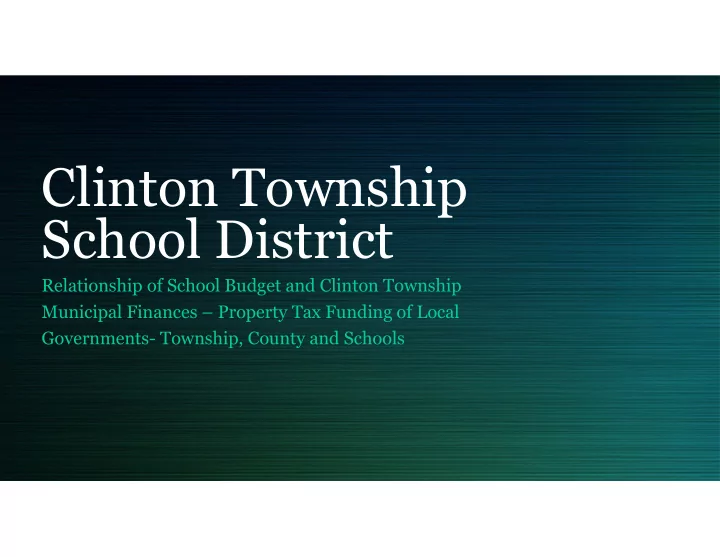

Clinton Township School District Relationship of School Budget and Clinton Township Municipal Finances – Property Tax Funding of Local Governments- Township, County and Schools
Clinton Township School District (“CTSD”) and Clinton Township (“Township”) • CTSD and Clinton Township are separate legal entities, each governed by elected officials acting as the respective entity’s Board of Directors. • Although separate legal entities, both CTSD and the Township rely largely on local property taxes to fund their budgetary operations. • NJ law designates the local municipal government unit (i.e. Township) to levy and collect the property taxes not only for its own operations, but also for Hunterdon County and the local school district (CTSD) and regional high school district. • The Township has a fiduciary responsibility to levy, collect and pay to the respective entities the property taxes collected on their behalf. • The Township and the county government operate on the calendar year; the school districts operate on a fiscal year (July 1 to June 30).
Calendar vs Fiscal Year – Why Does it Matter? • The Township levies all property taxes – Township, County, Local School and Regional High School – on the calendar year basis under which it operates. • Due to the difference in the calendar year vs fiscal year (July 1 to June 30), school property taxes are essentially levied six (6) months in advance. • When the Township fiscal year ends on December 31, it has already billed property taxpayers for the school taxes through the following June 30. • Question – If the Township bills school property taxes in advance, shouldn’t there be plenty of cash on hand to pay bills? • Answer – Yes, unless the municipality employs a financial device known as “Deferred School Taxes”.
Deferred School Taxes – What Are They? • NJ Budget Regulations allow for the “Deferral” of school taxes which are collected in the calendar year but not fully due the school districts until the following June 30 (the school fiscal year end). • The “Deferral” mechanism allows the Township (via a resolution passed by the Township Council) to count as municipal surplus on Dec 31 the property taxes that were billed to the Taxpayers as school taxes due through the following June. • The very next day, on Jan 1, the “Deferred School Taxes” become a liability due and payable to the school districts. If the Township spends the “deferred” taxes, it can create a cash flow crunch. Clinton Township has done this very thing, maximizing “deferrals” and creating financial challenges for CTSD. • The Township can only replace the expended funds by waiting for additional property tax collections (really next year’s school taxes) to arrive .
Township Finances – What is the Trend? • On December 31, 2003 the Township reported a Surplus of $5,700,593 and “deferred” school taxes of $(3,385,088) for a positive net position of $2,315,505. • On December 31, 2008 the Township reported a Surplus of $5,067,255 and “deferred” school taxes of $(6,600,000) for a net position of $(1,532,745). This was the first year the increasing “deferrals” drove the Township into a negative net position. • On December 31, 2016 the Township reported a Surplus of only $49,221 and “deferred” school taxes of $(19,485,338) for a staggering deficit net position of $(19,436,117). • Over the past seven (7) years, the Township deficit net position has increased $17,952,593 or an average of over $2.5 million annually .
Analysis of School Taxes Requested by Dec 31 Last Seven School Fiscal Years Tax Request Tax Request Total School Year School Fiscal Year % Jul-Dec Jul 1- Dec 31 Jan 1- Jun 30 Tax Levy 2011/2012 $ 14,643,135 $ 9,909,562 $ 24,552,697 59.6% 2012/2013 $ 14,586,117 $ 9,865,778 $ 24,451,895 59.7% 2013/2014 $ 14,647,273 $ 9,966,421 $ 24,613,694 59.5% 2014/2015 $ 14,736,996 $ 9,956,870 $ 24,693,866 59.7% 2015/2016 $ 14,399,550 $ 10,680,209 $ 25,079,759 57.4% 2016/2017 $ 14,315,520 $ 10,589,463 $ 24,904,983 57.5% 2017/2018 $ 14,399,481 $ 10,453,646 $ 24,853,127 57.9%
Analysis of School Taxes @Dec 31 Vs Deferred School Taxes - Last Seven Calendar Years Balance of FY School School Tax Deferred Municipal Tax Board Certified School Tax Request Levy Held by Twp @ @ Dec 31 per Net Balance @ Dec Calendar Year School Levy Jul 1- Dec 31 Dec 31 audit/AFS 31After Deferral 2011 $ 24,552,697 $ 14,643,135 $ 9,909,562 $ 8,000,000 $ 1,909,562 2012 $ 24,451,895 $ 14,586,117 $ 9,865,778 $ 9,000,000 $ 865,778 2013 $ 24,613,694 $ 14,647,273 $ 9,966,421 $ 10,000,000 $ (33,579) 2014 $ 24,693,866 $ 14,736,996 $ 9,956,870 $ 10,960,000 $ (1,003,130) 2015 $ 25,079,760 $ 14,399,550 $ 10,680,210 $ 12,000,000 $ (1,319,790) 2016 $ 24,904,983 $ 14,315,520 $ 10,589,463 $ 12,452,491 $ (1,863,028) 2017 $ 24,853,127 $ 14,399,481 $ 10,453,646 $ 12,452,491 $ (1,998,845)
Clinton Township Increase in Deferred School Taxes vs Decrease in Municipal Surplus $25,000,000 $20,000,000 $15,000,000 $10,000,000 $5,000,000 $- 1/1/2004 1/1/2005 1/1/2006 1/1/2007 1/1/2008 1/1/2009 1/1/2010 1/1/2011 1/1/2012 1/1/2013 1/1/2014 1/1/2015 1/1/2016 1/1/2017 Deferred School Taxes Municipal Surplus
Source: Requirements of Audit – Issued by Division of Local Government Services
Recommend
More recommend